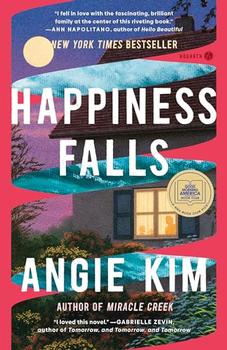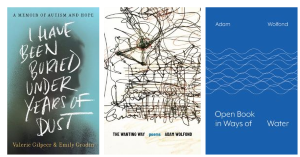Summary | Excerpt | Reading Guide | Reviews | Beyond the Book | Read-Alikes | Genres & Themes | Author Bio

A Novel
by Angie KimThis article relates to Happiness Falls
 In Angie Kim's Happiness Falls, Eugene is diagnosed with Angelman syndrome, or AS, a neuro-genetic disorder caused by a chromosome-15 gene deletion on the maternal side. Most people with AS have limited speech and motor abilities. It is important to distinguish Angelman syndrome and other conditions that involve learning disabilities from anxiety-related speech conditions such as selective mutism. Some neurotypical people may believe non-speaking people are lacking in the understanding necessary for communication in general, when in fact their communication needs are simply not served by speech, as is the case for Eugene. The See Us, Hear Us campaign discusses how this attitude harms people in detail through a series of documentaries. While a non-speaking character is represented in Kim's novel, it is important to note there are non-speaking people who are actively involved in their own representation through writing.
In Angie Kim's Happiness Falls, Eugene is diagnosed with Angelman syndrome, or AS, a neuro-genetic disorder caused by a chromosome-15 gene deletion on the maternal side. Most people with AS have limited speech and motor abilities. It is important to distinguish Angelman syndrome and other conditions that involve learning disabilities from anxiety-related speech conditions such as selective mutism. Some neurotypical people may believe non-speaking people are lacking in the understanding necessary for communication in general, when in fact their communication needs are simply not served by speech, as is the case for Eugene. The See Us, Hear Us campaign discusses how this attitude harms people in detail through a series of documentaries. While a non-speaking character is represented in Kim's novel, it is important to note there are non-speaking people who are actively involved in their own representation through writing.
Emily Grodin is a poet who has co-penned a memoir with her mother, Valerie Gilpeer, I Have Been Buried Under Years of Dust. The title is one of the first phrases Grodin wrote once she had access to the therapeutic and educational resources necessary to aptly communicate her thoughts, at the age of 25. Of her experiences, she tells Good Morning America, "Writing for me has quite literally allowed me to process certain events, but also the feeling of having a voice." Through her memoir, she communicates what it has felt like to be discredited throughout her life because she does not speak.
Adam Wolfond, author of The Wanting Way and Open Book in Ways of Water, is another non-speaking poet. He's interested in language beyond the bounds of verbal communication, and has done extensive research into the topic as a scholar and artist. An NPR article explains that he "collaborated with his mother on her Ph.D. dissertation, which examines the agency of language, how it emerges differently, and how its forms can be challenged. In their project S/pace, Wolfond uses sticks to create poetry, turning them in his hands to link sound with movement." Wolfond uses "language" as a verb, and sees poetry as a part of his body. He tells NPR, "[Poetry] is nature to me… And I think that non-speakers like me dance with language."
These are just a couple of examples of non-speaking artists who may soon become the loudest voices in the room, and I cannot wait to see the day they get their well-deserved recognition. As Jordyn Zimmerman, a non-speaking "advocate for all learners," insists: "Everyone has language… It is so important to understand that an IQ score doesn't consider our ways of being... When we start with the notion that everyone has the capacity to understand and use language, we can then provide access to the entire alphabet without controlling and manipulating a person with a disability by limiting their vocabulary."
Filed under Society and Politics
![]() This "beyond the book article" relates to Happiness Falls. It originally ran in October 2023 and has been updated for the
May 2024 paperback edition.
Go to magazine.
This "beyond the book article" relates to Happiness Falls. It originally ran in October 2023 and has been updated for the
May 2024 paperback edition.
Go to magazine.
Your guide toexceptional books
BookBrowse seeks out and recommends the best in contemporary fiction and nonfiction—books that not only engage and entertain but also deepen our understanding of ourselves and the world around us.